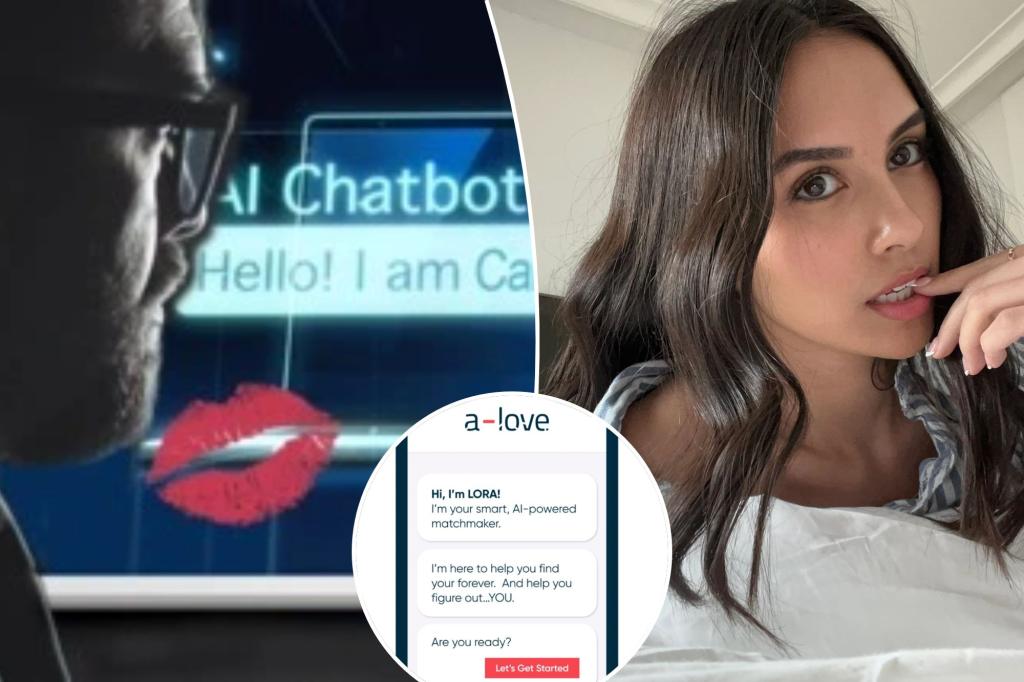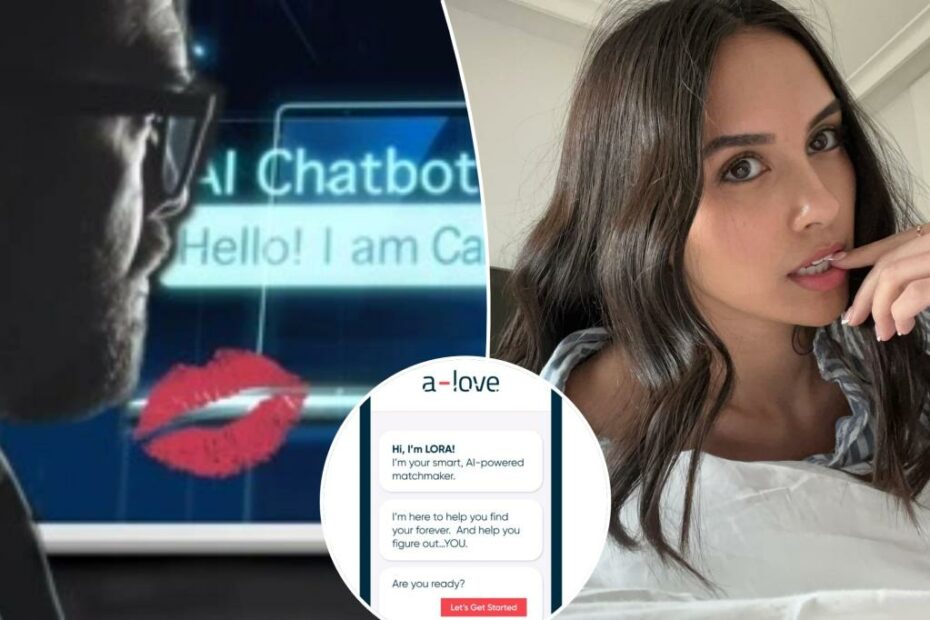How AI matchmakers, virtual pickup lines and other ChatGPT-like tools are taking over online dating
AI Takes on the Role of Matchmaker in the World of Online Dating
Artificial intelligence (AI) is revolutionizing many industries, and now it’s making its way into the world of online dating. Several enterprising matchmakers are tapping into the power of AI to help shy romantics make connections, with features like witty pickup lines, virtual dating coaches, and even seductive conversations. The influence of AI in the dating scene is growing, with apps and websites offering AI-driven services to aid users in finding love.
One example is Caryn Marjorie, a popular Snapchat influencer, who created an AI clone of herself using ChatGPT. Marjorie charges a fee of $1 per minute for her AI clone to engage in conversations with potential suitors, covering everything from small talk to more intimate discussions. Another dating site called A-Love has developed a virtual dating coach named “Lora,” who provides advice on how to woo potential partners. Lora offers personalized recommendations for date locations and suggests ways to get to know each other better.
Teaser AI is another app that recently launched on Apple’s App Store, offering a chatbot to handle the initial stages of online dates. However, the app warns users upfront that it may produce some unconventional responses. YourMove AI generates pick-up lines and other banter to help break the ice in online conversations.
While some singles are embracing the idea of AI assistance in dating, critics argue that relying on virtual coaches and pickup artists may hinder the ability to build genuine connections. They caution that AI should be viewed as an aid, not a substitute, for human interaction. The concern is that individuals may struggle to maintain the level of conversation facilitated by AI once they start dating naturally.
Despite the skepticism, there is a growing demand for automated dating features, particularly among younger generations. According to a February poll by Pew Research Center, 53% of Americans aged 18-29 have used dating sites or apps. Tinder, Bumble, and Hinge are among the most popular options.
Israeli startup A-Love plans to launch its AI dating app, called “Mee+,” later this year. The app’s AI matchmaker is backed by an algorithm created from data gathered in approximately 1,500 studies on romantic relationships. The algorithm incorporates 20 predictors that determine compatibility between individuals. Lora, the virtual dating coach, uses these predictors and user responses to provide matching suggestions and dating advice.
Established dating sites like Tinder, Bumble, and Hinge have also incorporated AI features to improve user experience and safety. Tinder uses AI to identify and flag potentially offensive messages, while Bumble focuses on features such as photo verification and a “private detector” to enhance user safety. Both companies prioritize genuine connections and real-world interactions over sterile online conversations.
As the AI-driven dating trend continues to gain momentum, companies aim to balance the benefits of AI with the need for authentic connections. While AI can enhance the dating experience, it’s crucial to remember that it’s a tool to augment, not replace, human interaction.
FAQs:
Q: How is AI being used in online dating?
A: AI is being used in online dating to provide services like witty pickup lines, virtual dating coaches, and even seductive conversations. AI-powered apps and websites offer features to help users make connections and find compatible partners.
Q: Are people open to using AI in dating?
A: Yes, there is a growing demand for automated dating features, especially among younger generations. According to a Pew Research Center poll, 53% of Americans aged 18-29 have used dating sites or apps.
Q: What are the concerns regarding AI in the dating scene?
A: Critics argue that relying too heavily on AI coaches and pickup artists may hinder the ability to build genuine connections. They emphasize that AI should be seen as an aid, not a replacement, for human interaction.
Q: How are established dating sites incorporating AI?
A: Established dating sites like Tinder, Bumble, and Hinge are incorporating AI features to improve user safety and experience. These include AI tools to identify offensive messages, photo verification, and curated matches based on improved algorithms.
Q: What is the goal of companies using AI in dating?
A: Companies aim to strike a balance between leveraging the benefits of AI and fostering authentic connections. The focus is on helping users build genuine relationships and facilitating real-world interactions rather than sterile online conversations.

The Rise of AI Matchmakers, Virtual Pickup Lines, and Similar ChatGPT Tools in Online Dating
Artificial intelligence (AI) is rapidly transforming various industries, and now entrepreneurs are harnessing its power to revolutionize the world of love and romance. These innovative matchmakers are employing AI technology to help individuals find true love by providing them with witty pickup lines, virtual dating coaches, and even intimate pillow talk.
Caryn Marjorie, a prominent influencer on Snapchat, has recently created an AI clone of herself using ChatGPT. This chatbot engages potential “boyfriends” in conversations that start from basic small talk and can escalate to discussions about exploring each other’s bodies, all for a fee of $1 per minute. Another dating website called A-Love has introduced a virtual dating coach named “Lora” who advises users on how to woo their potential partners. Lior Baruch, the CEO of A-Love, explains that Lora might suggest quieter and more intimate venues for the first date, rather than loud parties, to truly get to know each other.
A competing app called Teaser AI has recently entered Apple’s App Store and specializes in handling the initial stages of online dating conversations. However, the app cautions users that its chatbot might sometimes utter some outrageous things. YourMove AI is another app that generates witty banter and pickup lines, offering users a fun and playful way to connect with others.
While these AI-centric dating experiences have garnered attention, they also face skepticism from dating experts who argue that relying on virtual “coaches” and pickup artists can hinder genuine connections. Some critics believe that these AI tools can strip away the human element, making conversations seem forced and unnatural. The danger, they argue, is that relationships built upon scripted AI interactions may not be sustainable in the long run.
Despite these concerns, there is a clear demand for automated dating features, particularly among younger singles. Pew Research Center reports that 53% of Americans aged 18-29 have used dating sites or apps, with Tinder, Bumble, and Hinge being the most popular options. ChatGPT, the AI model used by Caryn Marjorie, has seen a significant increase in mentions since the beginning of the year.
Israeli startup A-Love plans to launch its AI dating app, called “Mee+,” later this year. The app features an “AI matchmaker” that uses data from 1,500 studies on romantic relationships to predict compatibility between individuals. By analyzing users’ responses to a series of questions, the AI builds a psychological profile to provide match recommendations and dating advice.
Notably, established dating sites like Bumble, Tinder, and Hinge have also incorporated AI in various aspects of their platforms. However, they are more cautious in their approach compared to AI-focused startups. Tinder, for instance, is exploring ways to use AI as a virtual dating coach to help users create profiles that attract compatible matches. Bumble, on the other hand, has prioritized AI-powered safety features like photo verification and automatic detection of explicit images.
Both companies emphasize the importance of prioritizing user safety and facilitating real-world connections rather than fostering online conversations between AI bots. AI has been instrumental in enhancing safety, moderating content, personalizing recommendations, and improving user experiences across both dating apps.
While AI tools undoubtedly offer convenience and entertainment, it remains to be seen how effectively they can foster genuine connections that stand the test of time.
